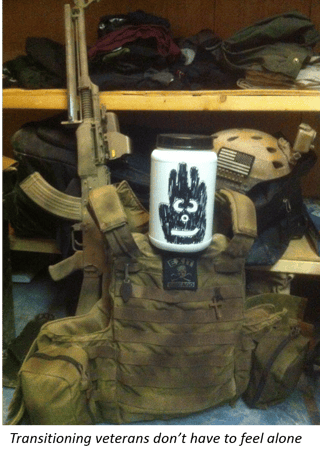(Guest post from Silent Professionals for returning veterans looking for employment)
At some point, if we’re still alive, it happens to us all: it’s time to come home.
For most people, this is a joyful event. For most veterans – especially those who have been in hard combat – this is an event filled with wildly conflicting emotions.
While war can take a great psychological toll on someone, much of the psychological toll is mitigated and managed by the fact that you’re with your brothers who have experienced the same things as you. The camaraderie and brotherhood amongst those who fight alongside one another is lifelong. The greatest toll of war actually comes during the transition back to “normal life”.
I remember coming back to my hometown from one of my deployments where I was engaged in fierce battles every single day out in a remote, barely-manned outpost in Afghanistan. Friends and family gathered to welcome me with a big party; even though – just the very night before – I had been in one of the fiercest battles of my over 10 years in contiguous combat.
The transition is abrupt and surreal. So much of the extremes that life and death can bring are packed into months and years of life away from home; but while you were gone, life continued. Children are grown, parents are older, spouses and significant others learned to live without you – if they are still with you, that is.
Civilians – including family – may welcome you home with seemingly warm words and gestures but look at you strangely when you react to the sound of thunder or a sudden, loud noise. Or they might ask you a lot of questions about things they don’t have any context to understand. Their concerns might be wrapped up in the latest TV series, or what the Kardashians are up to, or the latest work gossip or political scandal. It takes only a brief glance through news or social media feeds to see what is really most prominent in peoples’ lives.
But to civilians who may be reading this, veterans aren’t looking for pity or sympathy or even empathy. Veterans don’t want to tell you stories. They want to get on with our lives.
But what exactly does it mean to get on with life?
After a few challenging years of finding my way back to a “normal person life”, I can say that I’ve succeeded in achieving this goal; however, it was an incredibly difficult journey rife with some of my lowest lows. But a wise man once told me, “…a frog is lowest to the ground before it makes its largest leap.” If you’re a combat vet dreading the transition back to a normal person life, don’t worry: greater opportunities lie ahead, but to get there, there are a couple more battles that you have to fight first.
 First, you have to reckon with the fact that there are two major areas that need to transition: 1) your personal life and 2) your professional life. Your personal life needs attention first.
First, you have to reckon with the fact that there are two major areas that need to transition: 1) your personal life and 2) your professional life. Your personal life needs attention first.
If you don’t address this as your top priority, it will inevitably spill into your professional life and cause a vicious and downward spiral of dysfunction. Your first relationship is with yourself; take the time to be at peace with you. Civilians will not understand what you experienced in combat so expecting understanding here is an unfair expectation. Don’t let this upset you or cause you anger – remember that regardless of your experiences, you volunteered for service and for combat. But if you’re feeling overwhelmed and need to talk to someone who understands what you’ve been through, that’s what the brotherhood is for – your network doesn’t end just because your service did. Once you are at peace with yourself, you can re-establish your relationship with your significant other. Seek professional counseling if you need to. There are resources out there. Use them.
The next battle you’ll have to fight is in your professional life. It’s easy to avoid answering questions coming in from friends or family or random strangers, but it’s impossible to avoid the inevitable question from employers: “What’s your work experience?”
While many are willing to concede that combat vets have qualities and capabilities many of their civilian peers simply do not have, there is a great void in understanding exactly what those qualities and capabilities are. The lack of ability to translate skills and qualifications both ways is a major reason for otherwise highly qualified vets being passed over on job opportunities.
Many employers support hiring veterans. But just because employers support hiring veterans doesn’t mean employers owe you a job. I’ll say it again: you volunteered for service – no one owes you anything. The faster you reckon with that statement, the faster you’ll blaze a new and successful path forward.
That said, some of the best, hardest-working, honest, intelligent people I’ve ever met are veterans; conversely, some of the worst, laziest, dumbest people I’ve ever met are also veterans. It’s up to you to decide what you will do with the wealth of real-world experience and wisdom you gained. You can either choose to continue growing and challenging yourself to rise far above all your peers or you can stagnate and refuse to grow beyond where you are.
Once you make the obvious choice, don’t be afraid to reach out to your networks. Employers are always facing the challenge of finding hard-working and dedicated employees who aren’t afraid of solving problems or making decisions. For this reason, many large corporations across various industries have implemented veteran hiring programs: they understand the inherent value that veterans potentially bring to the workforce. With America being at war for over 16 years, the workforce across all industries has veteran representation. Veteran hiring programs are typically staffed by employees who are also veterans and understand how your experiences translate to hiring managers. Make every effort to meet them halfway and they will do the same. Be humble and be hungry.
Finally, don’t forget that it’s a small world. Be honest with your credentials and always operate and conduct yourself beyond reproach on any job. A strong reputation or a good attitude can carry you far just like a bad one can crush opportunities before they even materialize.
– Gonz
Visit the Silent Professionals job board to get started. Employers can post open positions or search the candidates database. Candidates can search open positions and setup your profile.



